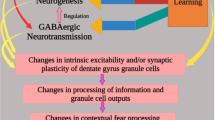Abstract
The protective effects of hypoxic preconditioning on the development of depressive states in rat models were studied. Three episodes of intermittent preconditioning using hypobaric hypoxia (360 mmHg, 2 h) prevented the onset of depressive behavioral reactions, hyperfunction of the hypophyseal-adrenal system, and impairments in its suppression in the dexamethasone test in rats following unavoidable aversive stress in a model of endogenous depression. The anxiolytic and antidepressant actions of hypoxic preconditioning in experiments on rats were no less marked than those of the tetracyclic antidepressant ludiomil. The results obtained here provide evidence that preconditioning with intermittent hypobaric hypoxia increases resistance to psychoemotional stresses, has marked anxiolytic and antidepressant effects, and can be used for the prophylaxis of depressive episodes.
Similar content being viewed by others
References
L. Bleshl’, “Depressive disorders: etiology and analysis of the situations in which they appear,” in: Clinical Psychology [in Russian], M. Perre and U. Baumann (eds.), Piter, St. Petersburg (2003), Second International Edition.
L. A. Vataeva, E. I. Tyul’kova, and M. O. Samoilov, “Effects of severe hypoxia on emotional behavior in rats: the correcting effect of preconditioning,” Dokl. Akad. Nauk, 395, 109–111 (2004).
A. A. Lebedev, V. V. Burdakov, and N. M. Mirgunova, “Treatment of patients with autonomic vascular dystonia using interrupted hypobaric hypoxia,” Zh. Nevropatol. Psikhiat., 92, No. 4, 50–53 (1992).
International Classification of Diseases, 10th Edition (ICD-10). Classification of Mental and Behavioral Disorders [Russian translation], Overlaid, St. Petersburg (1994).
M. M. Mirrakhimov, The Treatment of Internal Diseases in Mountain Climes [in Russian], Meditsina, Moscow (1977).
V. I. Morozov, V. S. Chaikovskii, S. A. Priyatkin, et al., “Radioimmunological analysis of steroids, scientific-applied aspects,” Fiziol. Zh. SSSR, 74, No. 8, 473–476 (1988).
Yu. L. Nuller, Depression and Depersonalization [in Russian], Leningrad (1981).
E. A. Rybnikova, L. I. Khozhai, E. I. Tyul’kova, et al., “Effects of hypobaric hypoxia on the expression of early gene proteins and structural changes in brain neurons: the correcting effect of preconditioning,” Morfologiya, 125, No. 2, 10–15 (2004).
M. O. Samoilov, The Brain and Adaptation (Molecular-Cellular Mechanisms) [in Russian], GNIU, St. Petersburg (1999).
M. O. Samoilov, E. A. Rybnikova, E. I. Tyul’kova, et al., “The Mitochondrial antioxidants thioredoxin-2 and Mn-superoxide dismutase are involved in the mechanisms of hypoxic tolerance of the brain,” Dokl. Akad. Nauk., 387, No. 3, 1–4 (2002).
M. O. Samoilov, D. G. Semenov, E. I. Tyul’kova, et al., “Molecular mechanisms of the short-and long-term effects of hypoxic preconditioning,” in: Questions of Hypoxia: Molecular, Physiological, and Medical Aspects [in Russian], Istoki, Moscow (2004).
M. O. Samoilov, N. A. Sitnik, E. A. Rybnikova, et al., “Characteristics of the expression of pro-and antiapoptotic proteins Bax and Bcl-2 in rat brain neurons in response to severe hypobaric hypoxia: the correcting effect of hypoxic preconditioning,” Dokl. Akad. Nauk, 402, No. 2, 1–3 (2005).
N. N. Sirotinin, “Effects of adaptation to hypoxia and acclimation to high mountain climes on the resistance of animals to various extreme treatments,” Patol. Fiziol., 5, 12–15 (1964).
I. B. Ushakov, I. N. Chernyakov, M. V. Dvornikov, et al., “Variants of interval Hypobaric and normoxic hypoxic training in space and military medicine,” in: Questions of Hypoxia: Molecular, Physiological, and Medical Aspects [in Russian], Istoki, Moscow (2004), pp. 411–419.
V. Henkel, P. Bussfield, H. J. Moller, and U. Hegerl, “Cognitive-behavioral theories of helplessness/hopelessness: valid models of depression?” Eur. Arch. Psychiat. Clin. Neurosci., 252, No. 5, 240–249 (2002).
E. Rybnikova, E. Tulkova, M. Pelto-Huikko, and M. Samoilov, “Mild preconditioning hypoxia modifies NGFI-A mRNA expression in the rat brain induced by severe hypoxia,” Neurosci. Lett., 329, No. 1, 49–52 (2002).
E. Rybnikova, L. Vataeva, E. Tyulkova, et al., “Preconditioning prevents impairment of passive avoidance learning and suppression of brain NGFI-A expression induced by severe hypoxia,” Behav. Brain Res., 160, No. 1, 107–114 (2005).
G. D. Schiller, O. Pucilowsky, C. Wienicke, and D. H. Overstreet, “Immobility-reducing effects of antidepressants in genetic animal model of depression,” Brain Res. Bull., 28, 821–823 (1992).
S. A. Stroev, T. S. Gluschenko, E. I. Tjulkova, et al., “Preconditioning enhances the expression of mitochondrial antioxidant thioredoxin-2 in the forebrain of rats exposed to severe hypobaric hypoxia,” J. Neurosci. Res., 78, No. 4, 563–569 (2004).
M. A. Tichomirova, M. E. Keck, H. J. Schneider, et al., “Endocrine disturbances in depression,” J. Endocrinol. Investig., 28, 89–99 (2005).
Author information
Authors and Affiliations
Additional information
__________
Translated from Zhurnal Nevrologii i Psikhatrii imeni S. S. Korsakova, Vol. 107, No. 7, pp. 43–48, July, 2007.
Rights and permissions
About this article
Cite this article
Rybnikova, E.A., Samoilov, M.O., Mironova, V.I. et al. The possible use of hypoxic preconditioning for the prophylaxis of post-stress depressive episodes. Neurosci Behav Physi 38, 721–726 (2008). https://doi.org/10.1007/s11055-008-9038-x
Published:
Issue Date:
DOI: https://doi.org/10.1007/s11055-008-9038-x




